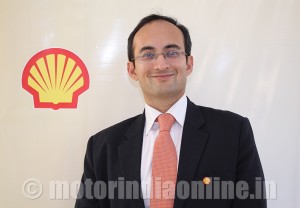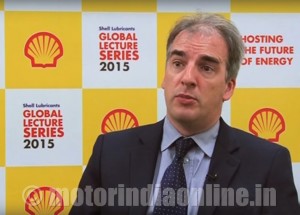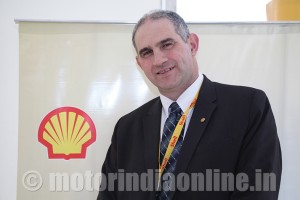Focus on superior lubricant and clean energy
What if you were to find liquid crystal lubricants – the same crystals found on the LCD television screen – replacing the regular lube in your car? Or that manufacturing industry now uses an ultra-nano-crystalline-diamond coating that possesses friction reducing properties to work for its mechanical systems?

These innovations in lubricants can help them make global industries improve their productivity using optimum amounts of energy, whether fossil fuel or alternate solutions.
Innovation has always held the key to make the world go round, literally. And many people in different parts of the world are relentlessly working the innovative magic in the field of lubricants. Innovations have in the past and even now made it essential for people, companies, industries and governments the world over to perform better and offer cleaner energy and energy-efficient technologies.
Early August 2015 saw the fourth Global Lecture Series conducted by Shell Lubricants with the theme “Preparing you for the future energy shifts in industry and transport”, hosted at IIM, Bangalore.
The lecture series put together a handful of noted experts and think-tanks to prise open the tightly closed fist of the global psyche to make efforts towards improving the quality of lubricants to help meet energy challenges. They addressed issues like increasing emission levels, continuous dependence upon fossil fuels, worsening quality of air and life the world over, and harnessing renewable energy sources so that dependence on fossil fuels is reduced. The panelists spoke at length on the future of India’s burgeoning energy needs, energy solutions that advanced lubricant technology can offer, and how lubricants have the capability to change the future of transport and technical services. This made it apparent that the concept of innovation is fast becoming synonymous with the phrase sustenance.
Perhaps the most telling quote of all experts came from Mr. Nitin Prasad, Managing Director of Shell Lubricants India, when he said: “There is no central awareness in selecting fuel mode in India. It differs from State to State. Tomorrow’s success depends on how well business, government, and civil society collaborate today.”
Speaking on the energy challenges staring us in the face, he quoted a catchy slogan – Churn, Innovate, Reform – to build his argument during the lecture.
In continuation, Dr. Cameron Watson, General Manager – OEM, and Direct Sector Technology, Shell Global Technologies, said: “There is no single solution for the energy challenges faced here. Our challenge is innovation and also efficiency in the short term. Another challenge is to unlock new technological solution for efficient and durable solution.”

He encouraged partnership between Shell Lubricants and the OEMs while stating the inevitable that dependence on fossil fuel will remain a key part of energy mix for the coming years. It is no secret that the OEMs are now expected to do a fine balancing act to conform to regulations and help along the way.
He was echoed by a few other speakers at the lecture, including experts like Mr. M. Rajagopalan, Market Development Director (Middle East and Asia), Wartsila India Ltd.
Dr. Felix Guerzoni, Global Product Application Specialist – Shell Global Solutions, wanted lube oils to perform better by showing properties such as withstanding higher temperatures and pressures, longer oil-drain intervals, experience cyclic operations better, anti-foaming and durable. He said, “there is greater demand for less downtime, and efficient improvements.”
He offered that Shell GTL possessed specific characteristics compared to other group III base oils, for example, possessing high flash point especially, in his view, when OEMs are moving towards smaller footprint equipment delivering more efficiently.
It is a fact that lubricants are an important element in the larger picture of energy efficiency. In a natural continuation, Dr. Watson explained how lubricants have been making a difference. “They reduce friction, and hence improve efficiency, protect wear and tear, reduce downtime and hence improve productivity. New technological designs look at lubes as a critical equipment design parameter.”
According to him, Shell Lubricants’ work is founded on three strong pillars of innovation, application and collaboration. The company has nearly 40 per cent global market share and owns five world-class lubricant research and development laboratories in Hamburg, Houston, Tokyo, Shanghai and Bangalore. They have nine base oil plants and 50 lubricant plants.

Lubricants the world over are used in a range of industries to facilitate different services. It is used in electricity generation in the form of turbine oils, oiling wind and gas turbine gear, as greases, in transmission of electricity as transformer oil, in transportation as engine and transmission oil, and in manufacturing industry in the form of hydraulic fluid, compressed oil and gear oils.
According to Mr. Rajagopalan, coal shall remain a dominant power source, what with 15000 MW plan to be added annually. On the other hand, he said 100 GW of solar power and 60 GW of wind power would get added by 2022.
Mr. Rajendra Petkar, Head – Power Systems Engineering, Tata Motors, elaborated on the role of lubes: “Fuel efficient norms, coupled with emission norms, may require oil beyond API C14. Better dispersants will be required. But can we not have a common oil?”
According to him, future regulations in India have to face harsher challenges and auto engines need to grow technologically. “With the stringent OBD requirement, there is need for efforts in making overall engine management system more reliable.” It becomes even more crucial in the face of depleting resources and wasteful use of fuel that lowers the output of industries and equipment.
By 2050, Indian population is slated to touch nine billion even as the growth rate plummets. Studies also show that the number of people living in cities will be 75 per cent and, in turn, will push energy demand to more than 200 per cent.
Mr. Prasad predicted: “Natural gas will become the backbone of the global energy system. There will be profound shift in global transport and infrastructure even as economic development slows down.”
He lamented the fact that power is increasingly being devolved and that while innovation and growth are on the rise, there is hardly any consensus building amongst the policy makers.
He echoed the view of Dr. Watson and Mr. Rajagopalan that liquid fuel and coal will continue to consistently dominate the energy situation in India. He awaits a day when solar energy is rediscovered and is harnessed to make it user-friendly and economical.
Speaking on the auto fuel policy, Mr. K. Srinivas, Deputy Director, Automotive Research Association of India (ARIA), suggested ‘one country one fuel quality’ consensus and ‘one regulation’ policy in India.
Dr. Watson said: “The scale of our energy challenges is such that a run-of-the-mill approach cannot make a difference.” And it is also true that in India every step of upgrading emission norms requires 4-5 years for them to become applicable.
Overall the panelists seemed to have agreed that there will be significant increase in the emission levels in the coming generations, especially in the scenario that the Central Government is eyeing to develop 100 smart cities. It is only natural to conclude that access to clean energy is critical which, in turn, puts pressure on technological development. And lubricants have a crucial role to play in alleviating the challenges being faced.